Sure, you know how delicious turmeric tastes, but there’s a lot more to the story for this humble spice. It’s a history that dates back thousands of years, and the amazing benefits of turmeric can have powerful implications for your health.
Turmeric comes from the root of the Curcuma longa plant, which is in the ginger family. This perennial plant, native to Southern Asia, has a deep orange color and a tough, brown skin.
Turmeric is one of the most popular spices in the world. If you’re a fan of Asian or Middle Eastern cuisine, you’re already quite familiar with its warm, peppery flavor. Turmeric is also the main spice in curry powder, as well as the ingredient that gives some mustards their bright yellow color. You can even use it to make drinks!
Love turmeric recipes?
Add power-packed anti-inflammatories to every meal with these FREE turmeric recipes!
But turmeric can do much more than just kick up the flavor of foods and beverages. It’s been a mainstay in Ayurveda (a medicine system with roots in ancient India) for thousands of years. We can find written references of this all the way back to 250 BC, when Sursuta’s Ayurvedic Compendium recommended making a turmeric-based ointment to relieve the effects of poisoned food. (1)
Modern scientific research has put this ancient wisdom to the test, confirming turmeric’s place as a culinary and nutrition powerhouse.
Turmeric Health Benefits
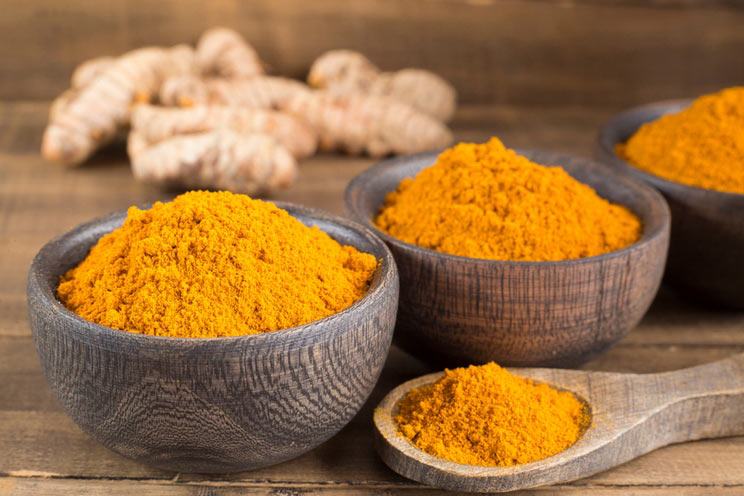
Turmeric contains a host of chemical components, but the most important are a group of compounds called curcuminoids. Curcumin, in particular, is one of the most extensively researched plant compounds around. A search on the PubMed database turns up more than 9,300 results and counting. (2) That’s even more than other famous herbs and spices like cinnamon, garlic, and ginseng.
All of this research has uncovered some impressive health benefits of turmeric…
Decreases Inflammation
Inflamed muscles and joints cause most of the pain we carry around every day. Left unchecked, chronic inflammation could lead to a laundry list of serious health issues like type 2 diabetes, heart disease, and even Alzheimer’s. (3, 4, 5)
Curcumin has a powerful anti-inflammatory effect, which eases swelling, aches, and pain. Researchers found that curcumin is capable of interacting with a variety of molecules involved in inflammation. By down-regulating activity of various enzymes, cytokines, and proteins, curcumin mitigates the inflammatory response. (6)
Some studies have even found that curcumin was just as effective as anti-inflammatory pain pills, like aspirin and ibuprofen, at suppressing the inflammatory response. (7) Give this turmeric-based morning elixir a try if you’re curious!
Antioxidant Effects
Oxidative stress occurs when reactive types of oxygen (free radicals) overwhelm your body’s natural antioxidant defenses. This imbalance – and the resulting damage – has been linked from everything to premature aging, neurodegenerative diseases, and even cancer. (8, 9, 10)
Thanks to its molecular structure, curcumin (a natural phenolic compound) can scavenge some of these free radicals and create an antioxidant effect. (11) Curcumin certainly neutralizes free radicals. (12) But it doesn’t stop there. It also strengthens the body’s natural antioxidant capabilities by increasing glutathione levels. (13)
Strengthens the Immune System
An interesting study published in the Journal of Clinical Immunology describes how curcumin acts as a “potent immunomodulatory agent” and can enhance antibody response. The researchers concluded further research was warranted to consider curcumin as a potential treatment for immune disorders. (14)
Turmeric also has antimicrobial properties. Various studies found that:
- It inhibited growth of histamine-producing bacteria, like Bacillus cereus and Proteus mirabilis. (15)
- It inhibited growth of V. parahaemolyticus, a foodborne pathogen. (16)
- It possessed good antifungal activity against Trichophyton longifusus. (17)
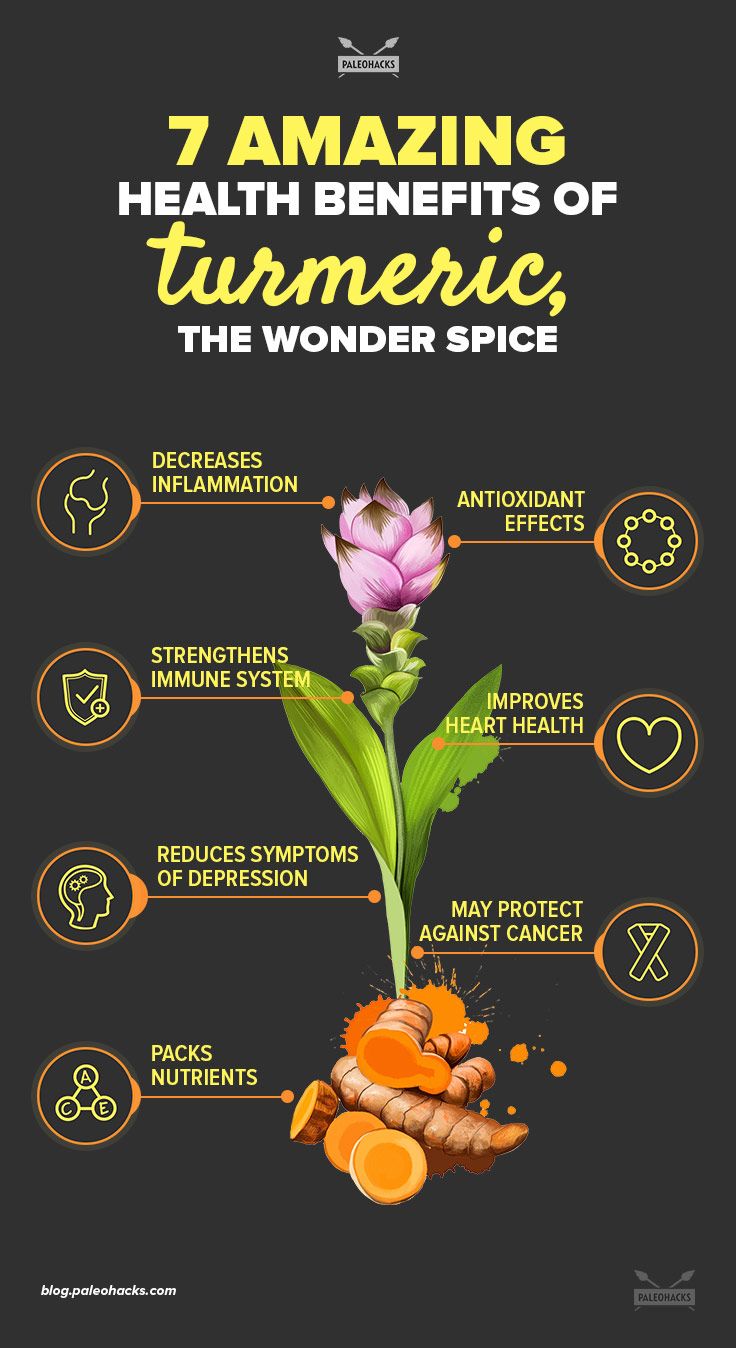
Improves Heart Health
With an estimated 610,000 deaths per year in just the United States, heart disease is the leading cause of death for both men and women. (18)
Curcumin can help keep your heart healthy and strong. Multiple animal studies found that this phenolic compound helps maintain endothelium (the interior lining of your blood vessels) function. (19, 20) This is important because endothelial dysfunction is a major contributor to heart disease. (21)
Curcumin’s anti-inflammatory and antioxidant properties also help because chronic inflammation and oxidative stress have been linked to heart disease. (22)
Reduces Symptoms of Depression
Curcumin could also help boost your mood. Multiple mice studies found that it increased serotonin and dopamine levels in the brain. It also inhibited monoamine oxidase (MAO) enzymes, a common mechanism of prescription antidepressants. (23, 24)
Although there have only been a few human studies, one was very promising. A 2014 study published in the journal Phytotherapy Research divided 60 volunteers with major depressive disorder into two groups. One group was given Prozac, and the other was given curcumin. The curcumin group was just as successful in managing their symptoms as the prescription pill group. (25)
Scientists aren’t completely sure how this mechanism works, though many suspect it involves curcumin’s positive effect on brain-derived neurotrophic factor (called “BDNF”) levels. (26, 27) BDNF is a protein that supports existing neurons and encourages new neurons and synapses to form. (28) It’s important for learning, memory, and higher thinking.
Potentially Protects Against Cancer
Decades of research have explored the potential of curcumin to prevent – or even help treat – different types of cancer. A massive review of numerous studies found that curcumin can:
- Suppress the proliferation of tumor cells
- Down-regulate certain transcription factors (proteins that bind to specific DNA sequences)
- Down-regulate growth factor receptors
- Inhibit the activity of key kinases (enzymes that regulate cell function). (29)
In other words, curcumin can attack cancer cells on multiple fronts. In some cases, it may help prevent cancer cells from even forming. (30) In others, it can slow the rate at which blood vessels form in tumors and how quickly cancer cells spread, as well as effectively kill some cancer cells. (31)
We desperately need more research to completely understand curcumin’s anti-cancer potential for humans. But the results of limited human data and animal studies have been very promising so far.
Packs Nutrients
In addition to all the nifty health benefits of turmeric mentioned above, turmeric is also a good source of nutrients.
Just one tablespoon of turmeric powder contains:
- 26 percent of the recommended daily value of manganese
- 16 percent of the recommended daily value of iron
- 6 percent of the recommended daily value of vitamin B6
- 5 percent of the recommended daily value of potassium (32)
Turmeric Supplements
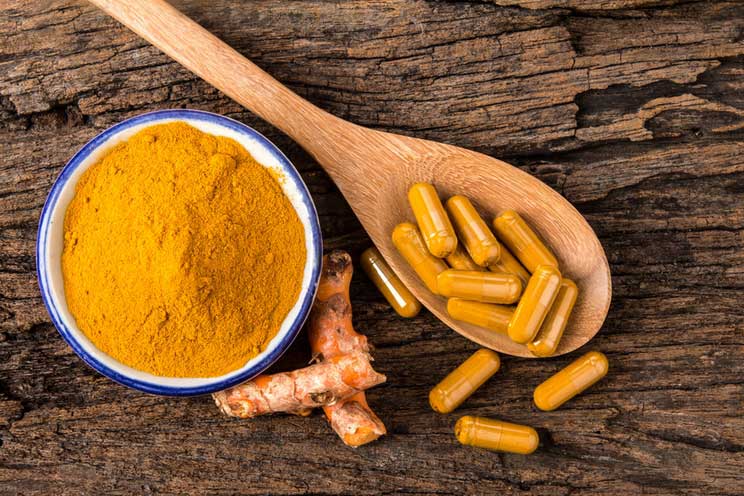
The first thing that comes to people’s minds with turmeric is cooking. And with good reason: it’s awesome in curries, seasoned meats, and other Asian and Middle Eastern dishes.
Seasoning your foods with turmeric certainly won’t hurt you. It’s low in calories, Paleo-friendly, and a good source of nutrients. But if you want to really reap the health benefits of turmeric, you’ll probably need to do a bit more. Why?
Because the turmeric root only contains between 2 and 5 percent curcumin, the compound you need to experience health benefits. (33) You’d have to use turmeric powder at every meal of the day to move the needle in terms of an effective curcumin dose. Many of the studies exploring health benefits of turmeric use dosages over 1 gram of curcumin daily. It’s pretty tough to reach that amount through just seasoning your food alone.
Throwing another wrench into things is curcumin’s limited bioavailability. (34) Even if you consume a good deal of curcumin, that doesn’t mean you’re absorbing it all. Fortunately, a high quality supplement can help you get the concentrated dose of curcumin you need.
How to Find Quality Turmeric Supplements
Hit up your local vitamin shop (brick-and-mortar or online), or even some grocery stores, and it won’t take you long to find turmeric supplements.
Manufacturers like to call them different things. Sometimes you’ll see them labeled as “Turmeric extract” or “Turmeric curcumin”. Other times you’ll just see “Curcumin”. No matter which name the manufacturer chose, these supplements tend to be pretty affordable and easy to find.
There are tons of turmeric and curcumin supplements on the market, but not just any will do. The first thing to consider is the dose. Because your body won’t absorb all of the curcumin, you want to make sure any supplement you buy contains a significant amount.
Buying mediocre turmeric supplements raises concerns like:
- A lack of active compounds and ingredients
- A lack of testing for quality or purity
- Lead and other heavy metals
Besides watching out for the things above, look for a supplement that contains black pepper extract. Adding this extract (sometimes called “piperine”) increases the bioavailability of curcumin dramatically – by up to 2,000 percent when taken at the same time, according to a study published in the journal Planta Medica. (35)
Remember: it’s not about how much curcumin your supplements contain. It’s about how much curcumin you’re able to actually absorb!
Recommended Brands
Here are some quality turmeric supplements to get you started:
- Indus Organic High Purity Turmeric Powder. This one isn’t actually a supplement, but I’m including it because it’s one of the highest quality turmeric spice options around. Grown in India, it’s 100 percent certified organic by the USDA and California Certified Organic Farmers.
- Natural Factors CurcuminRich Theracurmin. These capsules are non-GMO, as well as gluten-free, dairy-free, and soy-free. They use a special processing technique to reduce curcumin’s particle size and increase bioavailability. If you get the double strength version, you only have to take one capsule a day.
- Doctor Recommended Turmeric Curcumin. These USA-made capsules are made from an FDA-registered facility. They’re vegan-friendly, and they contain piperine (black pepper extract) to increase bioavailability.
- VitaBreeze Turmeric Curcumin Complex with Black Pepper Extract. Each of these capsules contains a potent 750 milligrams of curcumin. The pepper extract increases bioavailability. They’re also dairy-, soy-, and gluten-free.
Potential Side Effects
Unlike many modern medications, these supplements are extremely safe even at high doses. (36) You get to reap the health benefits of turmeric without stressing about dangerous side effects. Turmeric is on the FDA’s “Generally Regarded as Safe” list, and up to eight grams of curcumin daily have been administered for months in clinical trials without any serious adverse events. (37)
There are a few cases when you should be a bit more careful. If you’re pregnant or breastfeeding, it’s best to get the okay from your doctor before you start taking turmeric supplements. Just incorporating turmeric into your cooking for now might be the best call for you.
Watch out if you have gallstones. Curcumin actually contracts the gallbladder slightly for a few hours after consumption. (38) That isn’t an issue for the vast majority of us, but it can cause pain if you have gallstones.
Your Turn
Turmeric can kick up the flavor of your Paleo foods, and its curcumin extract can kick up your health. Whether you use it to season your meals, as a supplement, or both, there’s a lot to love about this plant.
What’s your favorite dish that incorporates turmeric powder? Have you ever tried turmeric supplements, and if so, have you noticed any benefits? Leave us a comment and share your experience!
(Read This Next: An Easy Guide to Activated Charcoal)


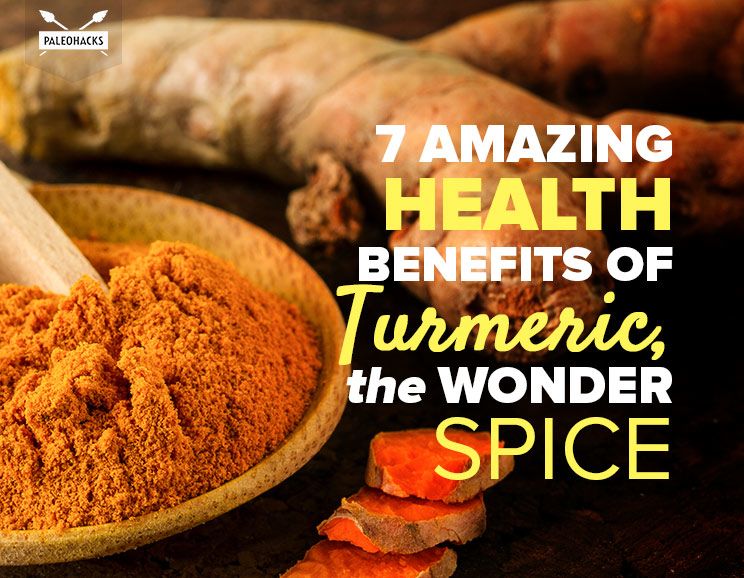
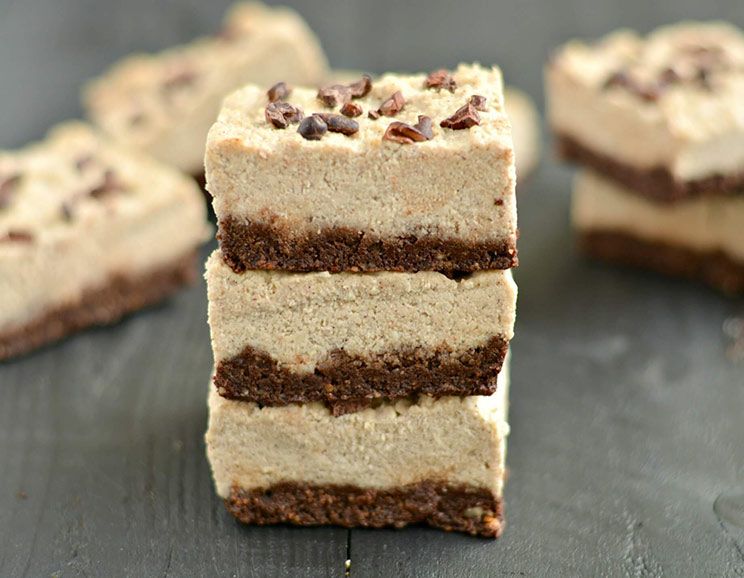 No-Bake Coffee ‘Cheesecake’ Bars
No-Bake Coffee ‘Cheesecake’ Bars
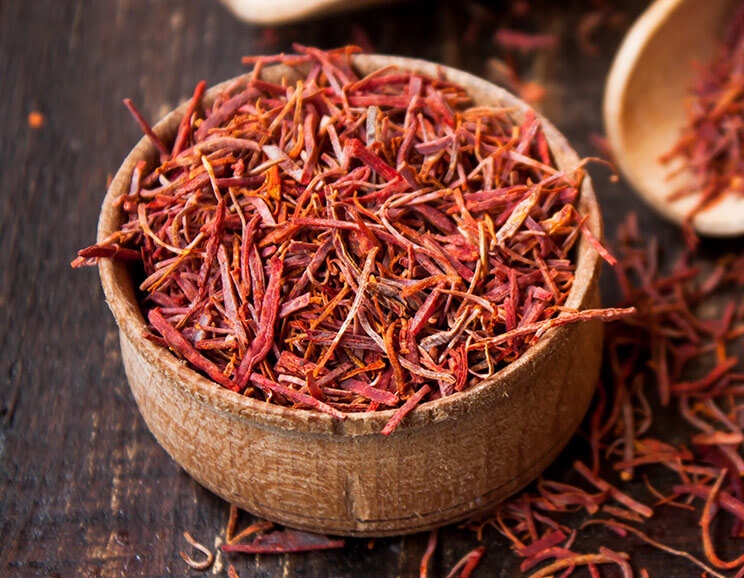
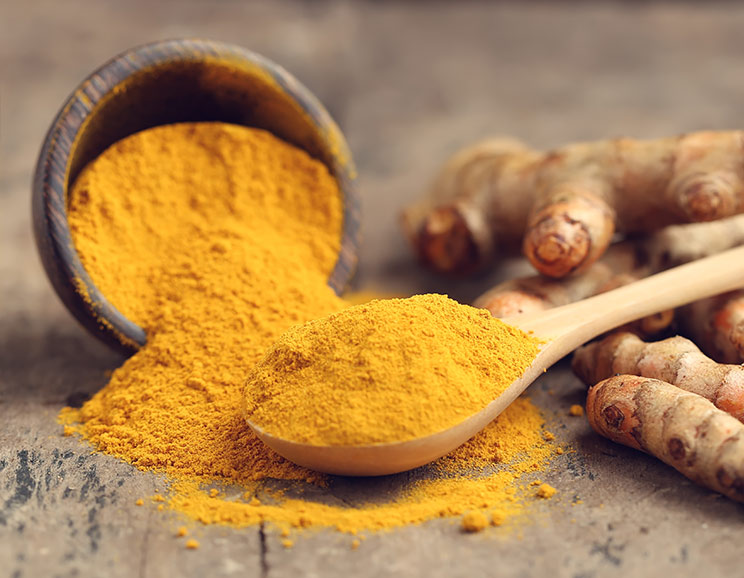
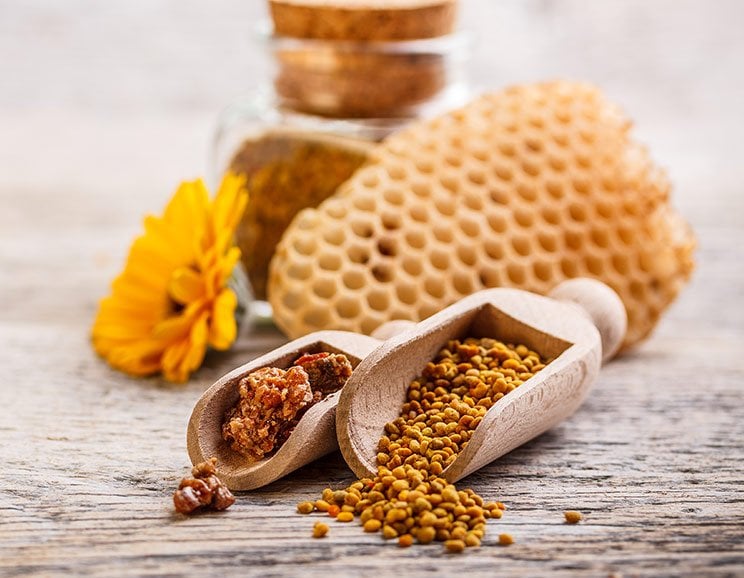

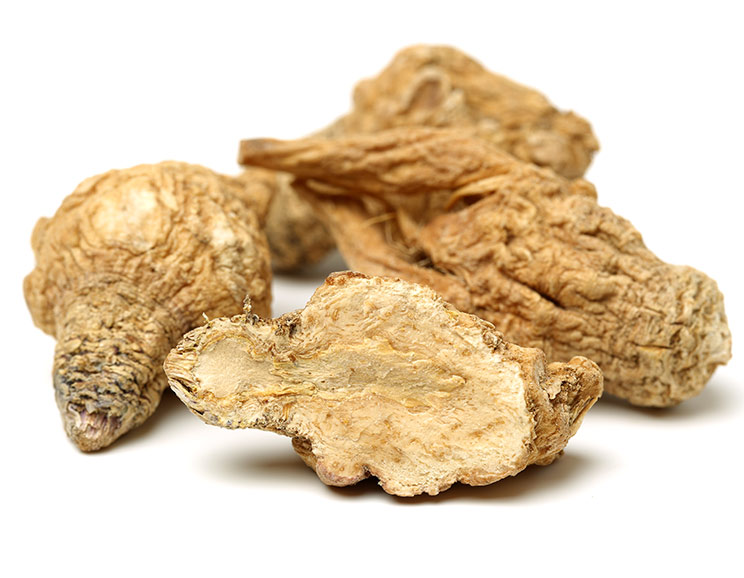
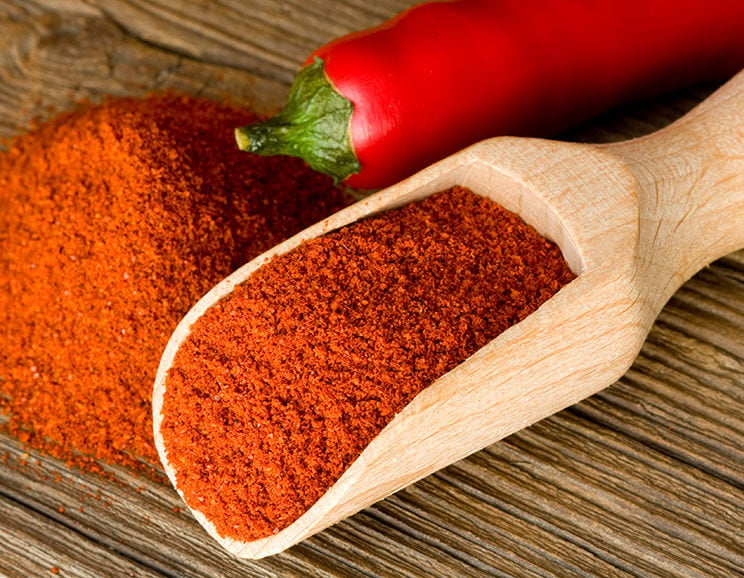
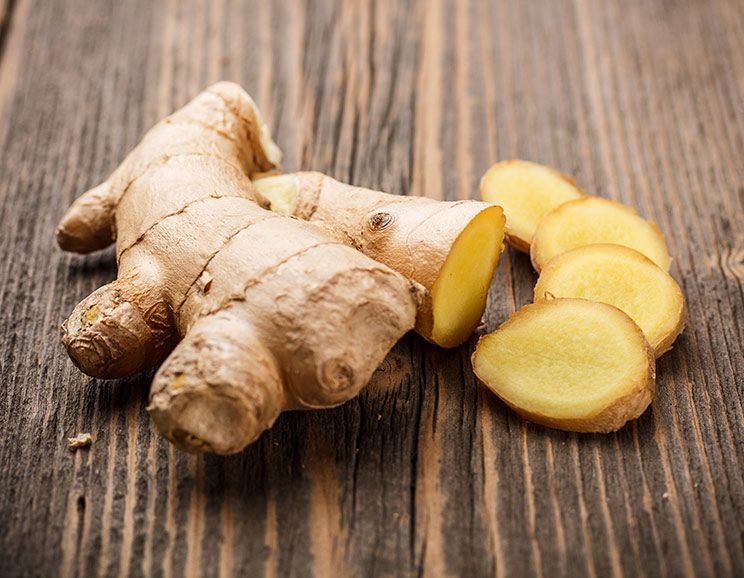

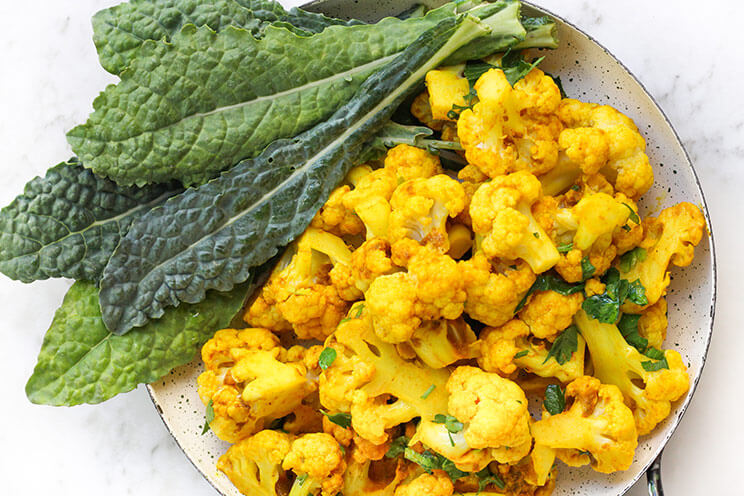
Show Comments